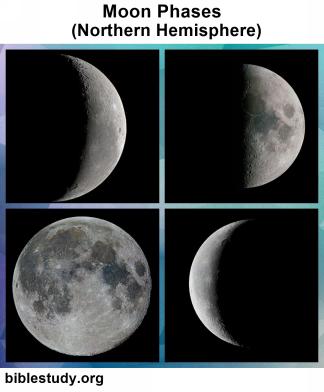Moons have, and continue to play, a critical role in determining when God's annual Feast days of worship should be kept. The first day of the Hebrew civil calendar is called Tishri 1 and always falls on a new moon. Once this day is determined, based on calculations and what is called postponement rules, all the other Feast days (Leviticus 23) for the year are set.
Tishri 1 is the annual Feast day of worship called the Feast of Trumpets (Rosh Hashanah). The moon also takes a role in other holy periods. Each year the Feast of Tabernacles in the fall and the Feast of Passover in the spring take place when the full, not the new, moon is visible.
Although the new moon is the foundation for determining the start of the Biblical calendar, there is no command that any special worship should take place every time it occurs.
In Leviticus chapter 23 God lists all of the days He commands His people to observe and to worship him upon. They are called "holy convocations" (Leviticus 23:1 - 2) because they are a commanded assembly based on his holy authority.

The days of worship all of Israel was to observe are the weekly Sabbath (Leviticus 23:3), the Passover (verse 5), the Days of Unleavened Bread (only the first and last days are convocations - verses 6 - 8), Pentecost (verse 21), Trumpets (verses 24 - 25), Atonement (verses 27 - 32), Tabernacles and Last Great Day (verses 34 - 36). There is no mention or command in this chapter for the average person to commemorate the new moon each month.
Priests at Jerusalem's temple, however, were commanded to fulfill specific requirements every time the New Moon took place. Trumpets were to be blown, and large numbers of sacrifices were required (Numbers 10:10, 28:11). The killing of sacrifices created a lot of meat to be eaten, so the new moon was a feast of sorts (see 1Samuel 20). Beyond the work of the priests, though, there were no statutory requirements of the people to worship on the day.
It should be noted that at certain times in Biblical history New Moons were a time when special events were held. For example, King Saul had a special meal on the day and expected certain guests to attend (1Samuel 20:5). King David and Saul's son Jonathan attended these meals.
Although King Saul had special meals or banquets on the days of the new moons, this does not show it was required of Israel as a whole. God never commanded kings partake of special meals on these days. It seems Saul simply had a tradition of having a good meal on these days.
In summary, here are the main reasons why believers today do not have to worship or otherwise observe New Moons that occur each month. First, there are NO commands anywhere in the Bible to observe new moons in a religious manner. Second, there are NO instructions, guidelines or even restrictions on the proper way to observe or worship during these monthly periods.
Third, Leviticus chapter 23 carefully lists ALL the days in the year God expects us to observe. The observation of any monthly special time is not listed! Fourth and last, inferences from references to the new moon during the millennial reign of Jesus Christ on earth (Isaiah 66:23) are not clear indications for what we today should be doing.
Taking note of a new moon, in the Old Testament, was one of the only ways people could keep an accurate track of the passage of time. The observation of these days in a religious sense, however, whereby worship of God was commanded, is not found in the Bible.